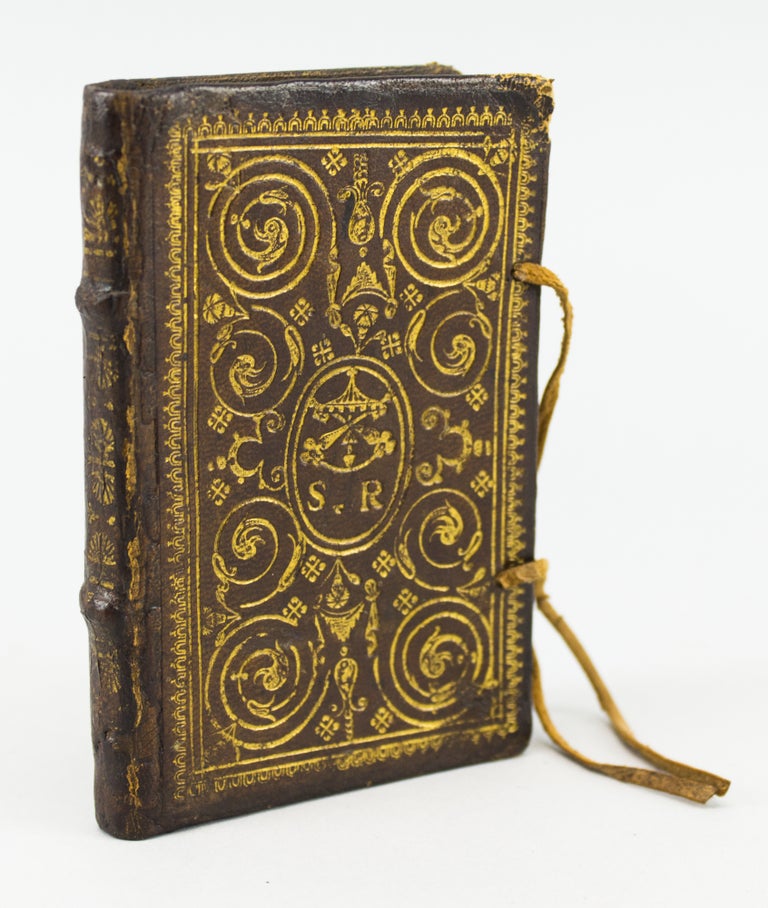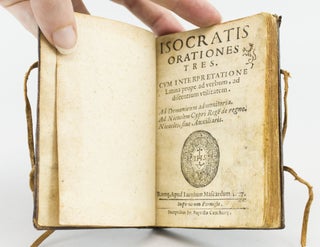ORATIONES TRES CUM INTERPRETATIONE LATINA.
(Rome: Iacobus Mascardus, 1617). 111 x 70 mm. (4 1/2 x 2 7/8"). 127, [1] pp.
FINE CONTEMPORARY ITALIAN BROWN MOROCCO, ORNATELY GILT, covers framed by plain rules and cresting roll, central panel with multiple leafy spirals and small tools surrounding a center oval containing THE "SEDE VACANTE" ARMS OF THE HOLY SEE comprising crossed keys beneath an umbraculum (i.e., a papal umbrella), this symbol flanked here by the letters "S" and "R," raised bands, spine panels with repeating gilt palmette tools, two leather ties, new but sympathetic endpapers, all edges gilt (recased, preserving most of original backstrip). Front free endpaper with ex libris of Podestà. ◆Upper corners a bit bumped, joints faintly rubbed, boards tending to splay just a little, title page slightly soiled (and with neat repairs), occasional minor foxing or small stains, but a very pleasing copy, generally clean and fresh with comfortable margins and a binding bright with gilt.
This small volume contains three of the great rhetorician's orations in parallel Greek and Latin text, in a lavishly decorated binding that has connections to the papacy or to an important Italian family that enjoyed papal favor. The symbol at the center of the boards here, showing the crossed keys and umbraculum, suggests that this might be a "sede vacante" binding: such an insignia was used by the Holy See when there was no sitting pope ("sede vacante" meaning "the seat being empty"). This symbol could also indicate possession by a family that had received a special grant from the pope to use the crossed keys and umbraculum. Among those so honored would have been the great lords who were invested with papal fiefs (for example, the Este, Farnese, and Montefeltro families). The absence of a coat of arms here might suggest that the present binding was not done for one of the great ducal houses, but rather for some other distinguished family. Whoever owned it--and the "S R" initials on the covers are probably those of the original owner--the decoration of our volume is certainly ornate enough to qualify it for distinguished shelves. The celebrated Attic orator and rhetorician Isocrates (436-338 B.C.) presided over a school of rhetoric in Athens for many decades. A shy man, he seldom spoke in public, but aired his political views in published speeches. He deplored the quarrelsomeness of the Greeks, and appealed to Philip of Macedon to lead them in a conquest of the Persian Empire, an undertaking realized by Philip's son Alexander. The first oration here is "To Demonicus," a moral treatise on good character addressed to a young man of that name. The other two orations are addressed to Nicocles, heir to the Cyprian throne, and outline the qualities of the ideal king. (ST13559b)
Price: $1,650.00


